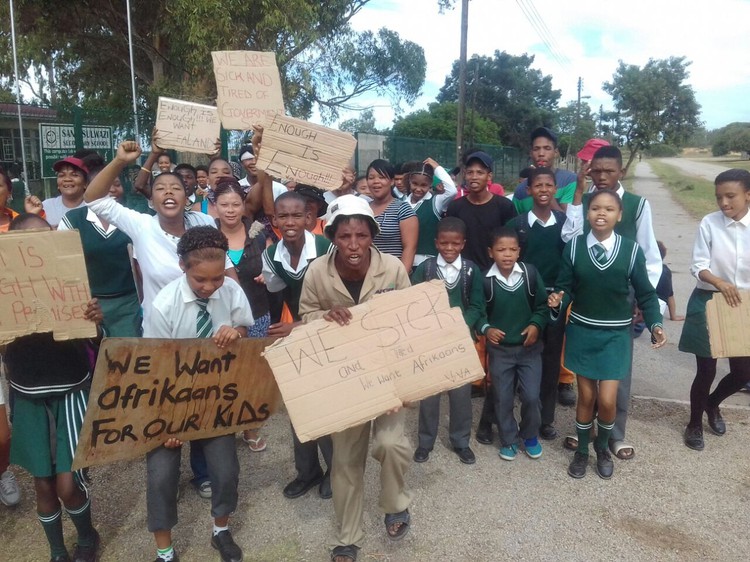Afrikaans-speaking parents threaten to close school
Students are failing because there is no teacher to teach their mother tongue
On Monday, about 80 disgruntled parents, learners and community members attempted to close Sandisulwazi Secondary School in Paterson, Eastern Cape. The protesters are demanding a teacher to teach Afrikaans as a subject.
Sandisulwazi has nine teachers, eight of whom are Xhosa-speaking and one English-speaking. There are 303 learners at the school, 65 of whom are Afrikaans-speaking.
Police arrived and the principal locked the gates to keep the protesters outside of the school grounds. The protest was peaceful with demonstrators singing and waving placards.
Isaac van Louw, a member of the School Governing Board (SGB), said, “There is no Afrikaans teacher since last May. We have held talks with the Department of Education on six occasions. Sadly, the talks have yielded nothing. It’s only promises and promises.”
He said the parents were going “to close the school so as to create an equal playing field for all learners.”
SGB chairman Alfred Salters said Afrikaans-speaking learners who wrote matric last year had failed because there had been no Afrikaans teacher. “We had a total of 121 Afrikaans-speaking children attending the school last year, but at present we are left with 65.”
Salters said people had sent their kids to schools in Port Elizabeth and Uitenhage, but many parents could afford the boarding fees at those schools.
Irene Billet, a parent, said, “We want the former principal back because he doubled as an Afrikaans teacher. Since he left last May, the school has been dogged by mismanagement and victimisation of the Afrikaans-speaking learners.”
Grade 12 learner Aloma Gouza said, “We are only four Afrikaans-speaking learners in my grade. We sit in an empty classroom when it is time for Afrikaans lesson. Our education system demands that learners have to pass their mother tongue language in order to proceed. I don’t see this happening.”
Ridley Cupino, who is repeating grade 11 after he failed Afrikaans, said, “I am very angry … It is discouraging that the conditions that made me fail last year are still the same … We play rugby when it’s time for Afrikaans lessons.”
Eastern Cape Department of Education spokesperson Mali Mtima said the department was aware of the situation. “We are talking with some retired educators to come out of retirement and assist us. We had the same problem with Sotho and Agriculture, but it was solved. We have students who are training in the Afrikaans language at colleges but they are not yet qualified to teach.”
“We are not giving parents and learners at Sandisulwazi School a timeline but we are hoping the problem will be resolved. We are also appealing to parents not to close the school.”
Support independent journalism
Donate using Payfast

Don't miss out on the latest news
We respect your privacy, and promise we won't spam you.
Next: Hundreds left homeless by another fire in Hout Bay
Previous: Apartheid survives beyond the grave
Letters
Dear Editor
It is a sad day when you read that there are no educators to teach an essential subject (which Afrikaans is to these poor learners) Especially if you know for a fact that it is not true.
All learners should be given the opportunity to pass the NSC examination because what future do these youngsters face? The lack of action by our government is basically pushing them towards crime and into poverty - chances are that they will remain unemployable due to a lack of that important key to a brighter future.
Please help these children. I would consider teaching them over weekends if the ECED stepped up and remunerated me and footed my gas bill.
Baie sterkte kinders en bly glo dat daar hulp sal kom voordat dit te laat is.
© 2018 GroundUp. 
This article is licensed under a Creative Commons Attribution-NoDerivatives 4.0 International License.
You may republish this article, so long as you credit the authors and GroundUp, and do not change the text. Please include a link back to the original article.

